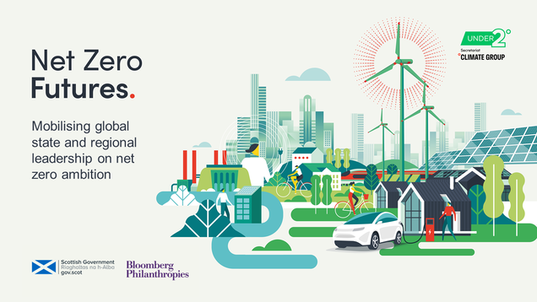One promising development we’ve witnessed since COP25 is an increasing number of countries announcing net zero emissions targets. Combined, these pledges currently account for more than half of global emissions. However, according to the most recent Emissions Gap Report by UNEP, many of these net zero emissions targets have large ambiguities. To accelerate emissions reductions in line with the Paris Agreement, it’s clear that net zero pledges at all levels must be credible, backed up with near-term actions as well as long term pathways.
State and regional governments across continents are committed to advancing the net zero agenda, however they don’t have all the answers. That’s why, through our Net Zero Futures project – led by the Scottish Government and in partnership with Bloomberg Philanthropies – the Under2 Coalition has been mobilising state and regional action towards net zero emissions planning and target-setting, and supporting them to identify common solutions.
To date, over 80 state and regional governments from around the world have taken part in the peer learning and knowledge sharing opportunities that Net Zero Futures has offered. Allowing them to make connections, learn from each other - as well as from experts - and better understand what it takes to set a credible net zero emissions target.
The project’s Dialogue Series, which was kickstarted earlier this year, has successfully united states and regions that have already set net zero targets with their peers in order to share latest best practice, boost efforts and solutions and to connect with an international community of peers going in the same direction.
The Dialogue Series has covered a range of important themes, including how to set a long-term vision in a participatory way, how to centre principles of equity and climate justice, decarbonisation pathway development and engaging key stakeholders along the journey. These are some of the key outcomes:
Session 1: Starting the journey – setting a regional net zero target and long-term vision
With a presentation by the Scottish Government, states and regions heard of the importance of engaging stakeholders when building a net zero vision and setting a net zero target. Strong stakeholder engagement, high-level political buy-in, interim emissions reduction targets, identifying priority sectors, and socio-economic and sustainability considerations are crucial.
This session was also informed by the Under2 Coalition’s Pathways Framework, which is supporting state and regional governments to develop a transformational process, or ‘pathway’, to reducing emissions through a 9-step process underpinned by leadership and political buy-in, and strong and transparent stakeholder engagement.
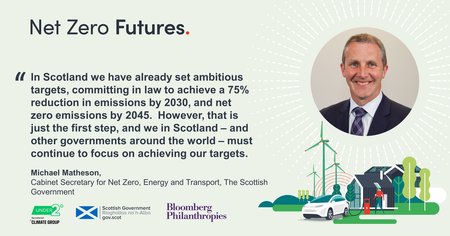
Session 2: Keeping equity and justice at the centre of your state or region’s net zero target
This session emphasised that equity must be at the centre of all climate policies. This includes offsetting, the speed of reductions, the scope of net zero targets, and investments. For example, in New York State, strong advocacy from environmental justice organisations resulted in the creation of the NYC Climate Leadership & Community Protection Act.
Governments should remember that reaching net zero emissions requires an economy-wide transformation. It is crucial, when signing emissions reductions targets into law, that the legacy of the impacts of fossil-fuel economies are acknowledged and addressed, particularly the impacts on disadvantaged communities.
Session 3: Developing a pathway to achieve a net zero target
Developing a long-term pathway to reach net zero is an important step in successfully reducing emissions. The pathway approach gives state and regional governments choice, so that they can make an informed decision on the best way to reduce emissions while supporting economic and social development.
Together with a 27-member advisory committee and external consultants, Washington State developed deep decarbonisation pathway models that explored the emissions reduction potential of electrification, heating systems in buildings, transport fuels, constrained resources and behaviour change. The models helped guide the development of policy recommendations in each sector and contributed to the state’s 2021 Energy Strategy.
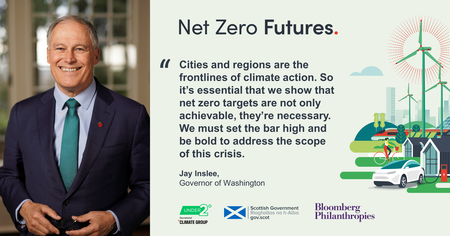
In São Paulo, a state that took part in our Climate Pathway Project, one of the biggest challenges in developing decarbonisation pathways was found to be continuity. Governments must therefore foster understanding and management of pathway tools, with the help of third-party experts if necessary. They also highlighted the importance of stakeholder engagement and making sure that local communities feel a sense of ownership early on in the process.
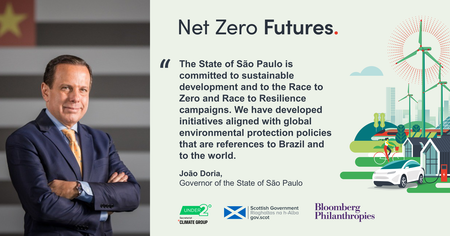
Session 4: Defining sectoral policies to achieve net zero emissions
In order to reach net zero emissions, every sector of the economy must be transformed. States and regions are key to driving this transformation, through their influence on policy making and the signals they’re sending to the companies and investors within their jurisdictions.
Baden-Württemberg recently announced its climate neutrality target by 2040 and is driving an energy transition in order to make that happen. The government is transforming old energy infrastructure to accommodate new forms of energy generation, demonstrating to firms that they can use current grid infrastructures and harness the potential of existing skilled workers in the green energy industries of the future. As ever, cooperation between ministries has been key in developing their 2021 Energy Strategy, especially regarding the expansion of renewables.
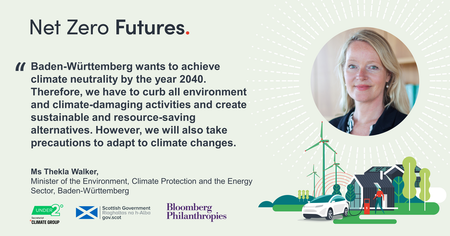
Session 5: Engaging key stakeholders on your net zero emissions journey
Methods for encouraging stakeholder involvement can vary. In Catalonia, for example, one method used by the government to minimise resistance to mandatory carbon measures was to hold sessions with the sectors most likely to be impacted to understand their concerns. As a result of this, Catalonia faced much less resistance to CO2 taxation than anticipated.
The session also featured insights from We Mean Business Coalition around net zero standards for companies. Small businesses in particular face large knowledge gaps in how to reach net zero. They require support from regional governments to guide them to the right resources and policies to support their net zero commitments. That’s why, for a successful transition to net zero, engaging the right stakeholders should be a top priority.

What’s next?
Net Zero Futures is continuing to build on its successes to date, complementing global learning sessions with smaller group discussions on specific issues of going net zero, such as how to develop local carbon offsetting schemes or dealing with resistance to new renewable energy plants. Currently, 37 members of the Under2 Coalition have set net zero targets, and this number is growing.
Additionally, the project empowers governments to join the UN’s Race to Zero campaign and supports them in doing so while also verifying and assessing their net zero targets. To date, there are 42 state and regional governments signed up to the Race to Zero, all committed to review their progress next year.
To find out more about the Net Zero Futures project and Dialogue Series, visit our webpage where you can also download session summaries and recordings.
